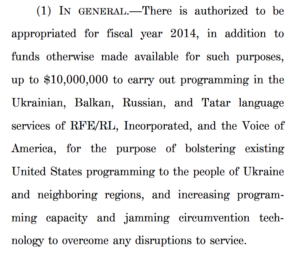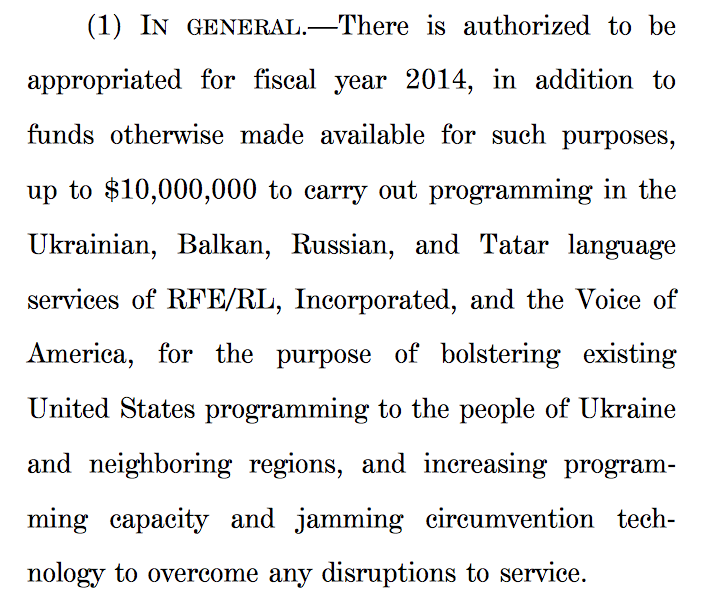BBG Watch Commentary
 Today, the House Foreign Affairs Committee, chaired by U.S. Rep. Ed Royce (R-CA), passed with overwhelming bipartisan support, H.R. 4278, the Ukraine Support Act, which includes $10 million to increase substantive Radio Free Europe / Radio Liberty (RFE/RL) and Voice of America (VOA) news programs to Ukraine.
Today, the House Foreign Affairs Committee, chaired by U.S. Rep. Ed Royce (R-CA), passed with overwhelming bipartisan support, H.R. 4278, the Ukraine Support Act, which includes $10 million to increase substantive Radio Free Europe / Radio Liberty (RFE/RL) and Voice of America (VOA) news programs to Ukraine.
Sources told BBG Watch that the BBG Board, which does not have much confidence in VOA’s top leadership, plans to give most of the surge money to RFE/RL.
UPDATE: It should be pointed out that at this point the House bill only authorizes $10 million. Without an appropriation from Congress, the money would have to come from the existing BBG budget. Such unfunded mandates are not uncommon. It should also be pointed out that RFE/RL and VOA Ukrainian and Russian services do not as a choice target very young audiences, but there has been a tremendous pressure from IBB strategic planners, marketing specialists and executives, as well as from some top VOA executives, to dumb down programs while at the same time the same executives have been diverting resources from hard-news reporting, especially at the VOA newsroom. VOA news reporting in general has become sporadic and more suited to unsophisticated and younger audiences.
Sources told us that RFE/RL targets professionals between the ages of 20 and 40. It does appear, however, that Putin enjoys the greatest support in Russia and among Russian-speakers in Ukraine, including Crimea, among those over 40. This group may be more likely to watch television and listen to radio than the younger group, which uses the Internet much more to get news. Sources also told BBG Watch, that both IBB and RFE/Rl staffers helped to draft the media-related portions of the Ukraine Support Act and that congressional staffers were impressed with all reporting by Ukrainian and Russian services. Sources also say that members of Congress, including Chairman Royce and Ranking Member Eliot Engel, are concerned with overall management of VOA programs and resources.
RFE/RL and VOA were told by the House Foreign Affairs Committee to “provide news and information that is accessible, credible, and accurate” and to “emphasize investigative and analytical journalism,” to counter misinformation from Russia’s official media.
The legislation was introduced last week by Chairman Royce and Ranking Member Eliot Engel (D-NY).
The bill says that “the opinions and views of the Ukrainian people, especially those people located in the eastern regions and Crimea, are not being accurately represented in Russian dominated mass media.”
It further notes that “Russian forces have seized more than five television stations in Crimea and taken over transmissions, switching to a 24/7 Russian propaganda format; this increase in programming augments the already robust pro-Russian programming to Ukraine.”
Republicans and Democrats concluded that “United States international programming has the potential to combat this anti-democratic propaganda.”
The bill orders Radio Free Europe/Radio Liberty (RFE/RL) and the Voice of America to:
(1) provide news and information that is accessible, credible, and accurate;
(2) emphasize investigative and analytical journalism to highlight inconsistencies and misinformation provided by Russian or pro-Russian media outlets;
(3) prioritize programming to areas where access to uncensored sources of information is limited or nonexistent, especially populations serviced by Russian supported media outlets;
(4) increase the number of reporters and organizational presence in eastern Ukraine, especially in Crimea;
(5) promote democratic processes, respect for human rights, freedom of the press, and territorial sovereignty; and
(6) take necessary preparatory steps to continue and increase programming and content services to Russia.
Sources told BBG Watch that specific language regarding the program content is designed to prevent Voice of America executives and International Broadcasting Bureau (IBB) strategic planners and marketing experts from using the money on producing non-news feature reports, such as the VOA blood-thirsty zombie Uncle Sam video for Pakistan.
Sources told BBG Watch that such videos are produced not because VOA journalists want to produce them, but because VOA executives have failed to provide leadership and the organization is under heavy pressure from IBB to target very young, even pre-high school audiences (although no longer in Russia and Ukraine, other sources point out — previous RFE/RL management which was replaced in early 2013 produced such videos for Kazakhstan), and to get such videos placed on affiliate stations. Members of Congress disagree with this IBB-VOA strategy, as do increasingly BBG members, sources explained to BBG Watch in discussing the wording of the Ukraine Support Act with regard to program content.
Sources also told BBG Watch that in any case Broadcasting Board of Governors (BBG) members intend to give most of the additional funding to expand Radio Liberty programs because RFE/RL is better managed and has extensive on-the-ground presence. But BBG members also think highly of the VOA Ukrainian Service which is expected to receive some surge funding, sources told BBG Watch. VOA management has for weeks failed to provide the service with sufficient additional staff and resources, which prevented the service from promptly updating its website and social media pages. While VOA Ukrainian Service and to some degree VOA Russian Service responded quickly to the crisis, VOA top management was slow to respond and to offer help.
The bill mentions placement of Russian-language programs on affiliate stations in Ukraine — which RFE/RL used to have in early 2000s but which had been eliminated on specific orders of IBB strategic planners who also ended VOA radio broadcasts to Ukraine, including eastern Ukraine and Crimea, as well as to Russia. Sources told BBG Watch that Congressional staffers of the House Foreign Affairs Committee are very well aware of these decisions by IBB officials.
The bill further instructs RFE/RL and Voice of America to:
(1) prioritize programming to eastern Ukraine, including Crimea, and to ethnic and linguistic Russian populations, as well as Tatar minorities;
(2) prioritize news and information that directly contributes to the target audiences’ understanding of political and economic developments in Ukraine, including countering misinformation that may originate from other news outlets, especially Russian-supported news outlets;
(3) provide programming content 24 hours a day, seven days a week to target populations, using all available and effective distribution outlets, including
(A) at least 8 weekly hours of total original television and video content in Ukrainian, Russian, and Tatar languages, not inclusive of live video streaming coverage of breaking news, to be distributed on satellite, digital, and through regional television affiliates by the Voice of America; and
(B) at least 14 weekly hours the total audio content in Ukrainian, Russian, and Tatar languages to be distributed on satellite, digital, and through regional radio affiliates of RFE/RL, Incorporated;
(4) expand the use, audience, and audience engagement of mobile news and multimedia platforms by RFE/RL, Incorporated, and the Voice of America, including through Internet-based social networking platforms; and
(5) partner with private sector broadcasters and affiliates to seek and start co-production for new, original content, when possible, to increase distribution.
The bill provides up to $10,000,0000 in additional funding in fiscal year 2014.
“There is authorized to be appropriated for fiscal year 2014, in addition to funds otherwise made available for such purposes, up to $10,000,000 to carry out programming in the Ukrainian, Balkan, Russian, and Tatar language services of RFE/RL, Incorporated, and the Voice of America, for the purpose of bolstering existing United States programming to the people of Ukraine and neighboring regions, and increasing programming capacity and jamming circumvention technology to overcome any disruptions to service.”
